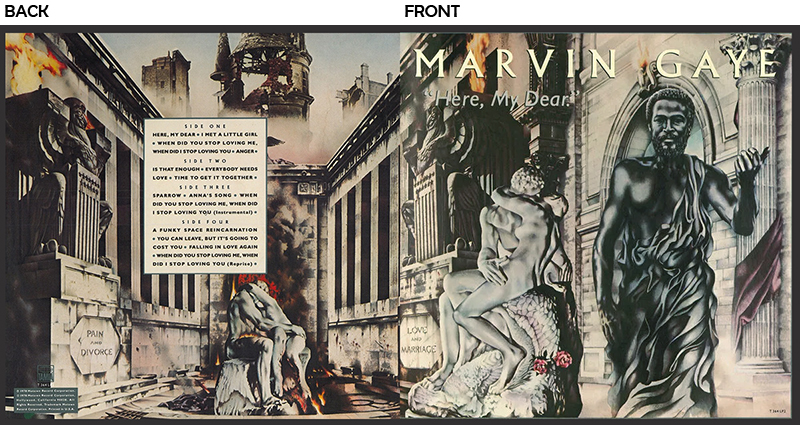| Back to Genre |
 |
|
 |
Rating: Excellent |
There are records that seem intended not as entertainment, but as an open diary into which the listener is almost unashamedly allowed to peer. Marvin Gaye's 1978 album, Here, My Dear, is one such album. It emerged from a bitter divorce from his ex-wife, Anna Gordy, sister of Motown boss Berry Gordy. Their relationship had been complicated for years: there were accusations of infidelity, financial problems, and mutual recriminations. Gaye was also embroiled in an increasingly problematic lifestyle, with drug use and debt putting further strain on his marriage. Ultimately, this led to a divorce that was not only painfully personal but also had a huge impact on his business. As part of the settlement, Gaye had to give the proceeds from his next album to Anna. What began as an obligation, however, became one of the most personal, confrontational, and radical records of his career. The title says it all: this is your record, my dear, I made it for you—and the content is anything but veiled.
The music itself exudes a blend of vulnerability, anger, melancholy, and even irony. Instead of a commercial attempt to score more hits, Gaye opted for long, drawn-out grooves, almost meditative in nature, where his voice constantly drifts between whispering, singing, and talking. This creates the feeling of being in an intimate jam session where the singer is offering himself therapy. It's not an easy record to get into, but once you're sucked in, it won't let you go. The hypnotic nature of the rhythms almost makes you forget that a painful reality lies beneath the sound.
What's immediately noticeable is that Gaye doesn't bother with radio-friendly structures. The songs are often long, repetitive, and slowly build tension. This makes the album more akin to a spiritual journey than a classic soul record. Yet, in every track, you hear that unmistakable warmth and sensuality of Marvin Gaye. Even when he sings about divorce, conflict, and disappointment, a certain beauty resonates, as if he's immersing his pain in music, making it bearable. The contrast between the sometimes bitter lyrics and the warm musical undertones creates a layered and captivating listening experience.
The lyrics are remarkably honest and often painfully concrete. Gaye addresses his ex-wife directly, describing scenes from their marriage, but also his feelings of betrayal and his longing for freedom. In other hands, this could easily have degenerated into bitterness, but with Gaye, it becomes a work of art. He dares to expose himself so much that the listener is practically listening with red ears. This isn't a record you'd put on at a party, but one you'd listen to in a quiet room, perhaps late at night, when you're contemplating love and loss. The intensity of that honesty is rare in pop music and makes the album timeless.
Musically, Here, My Dear is also a wondrous experience. The arrangements are rich but never overflowing, with ample room for keyboards, percussion, and subtle brass. It's as if Gaye deliberately keeps the instrumentation light, allowing the words and emotional charge to remain central. The groove is ever-present, but more hypnotic than exhilarating. It evokes an ongoing inner conversation, with music as its foundation. His voice sounds sometimes tormented and sometimes resigned, as if he's journeying from pain to acceptance.
When the album was released in 1978, critics and audiences were stunned. This wasn't a follow-up to the sensual "Let's Get It On" or the spiritually charged "What's Going On." This was something radically different: an outpouring that paid little heed to convention. Commercial success therefore eluded it, but the record later achieved cult status. Today, "Here, My Dear" is considered one of the most honest and daring statements in pop history. It demonstrates how an artist can push the boundaries of their medium to translate their most intimate emotions into art. In that sense, it anticipates the way later generations of artists would process personal trauma in their music.
The consequences for Marvin Gaye himself were dire. His financial situation remained precarious, and the tensions surrounding his personal life only increased. Ultimately, he fled to England in the early 1980s to escape debt, tax burdens, and legal conflicts. In a sense, "Here, My Dear" foreshadowed that flight: the record sounds like a man trying to grasp a life that's increasingly slipping away from him. Listening, you hear not only the pain of a broken marriage, but also the broader feeling of someone desperately searching for a way out.
Listening to this album requires patience and openness. It's not about instant gratification, but a long journey through the soul of a man grappling with loss and responsibility. That's precisely what makes it so powerful. While much music about love gets bogged down in clichés, Marvin Gaye delivers a story here that is raw and unfiltered, and therefore all the more human. The album exposes the fragility of relationships and shows how thin the line can be between love, passion, and destruction.
Here, My Dear may not be Marvin Gaye's easiest album to listen to, but it is one of the most essential. It's a document of the times, a love letter and a divorce decree all rolled into one, wrapped in music that slowly but surely gets under your skin. Those willing to truly listen will discover a masterpiece that still confronts its listeners and offers comfort at the same time. The album demonstrates that music can be not only a means of providing pleasure, but also a mirror in which we recognize our own emotions.
= Full Album Play List =
= Track List =